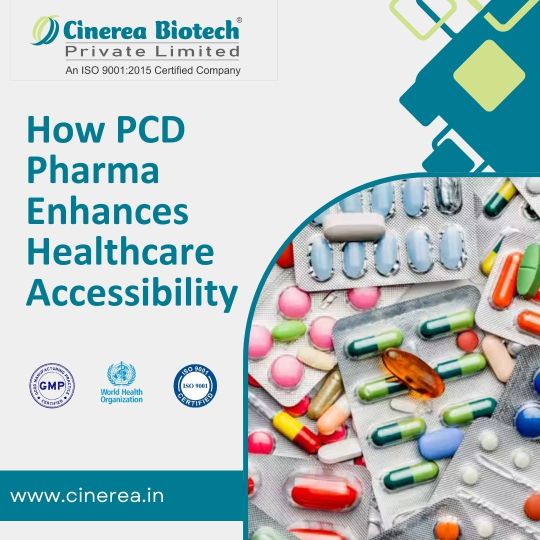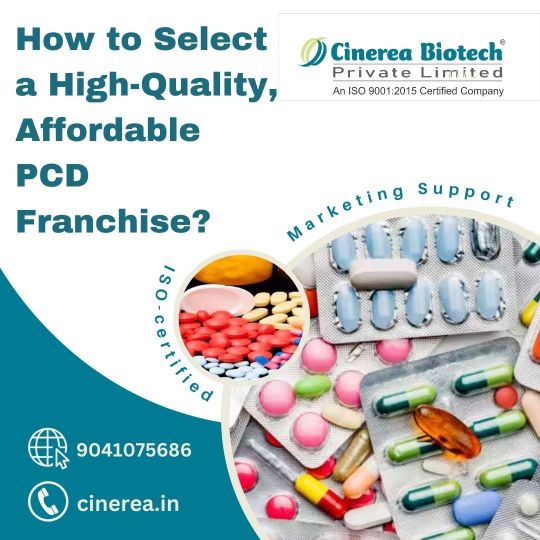Don't wanna be here? Send us removal request.
Text

Top Pharma Companies In Ahmedabad
Looking for the top pharma companies in Ahmedabad? The city is a major pharmaceutical hub, home to leading companies known for high-quality medicines, R&D, and global exports. From Cinerea Biotech to Torrent Pharma, Ahmedabad hosts some of the best in the industry.
Whether you need bulk drug suppliers, PCD franchises, or third-party manufacturers, these companies offer reliable solutions. Explore the best pharma firms in Ahmedabad for quality healthcare products!
0 notes
Text

How PCD Pharma Enhances Healthcare Accessibility
Access to quality healthcare remains a major challenge in many parts of the world. High costs, geographical limitations, and inefficient distribution systems often prevent people from receiving essential medicines.
PCD pharma companies play a crucial role in bridging this gap by ensuring affordable, widespread, and timely availability of pharmaceutical products.
In this blog, we will explore how PCD pharma contributes to improving healthcare accessibility and why it is a key player in the pharmaceutical industry.
1. Understanding PCD Pharma
PCD pharma operates on a franchise-based model, where pharmaceutical companies grant marketing and distribution rights to small businesses or individuals. This allows localized medicine distribution, ensuring that drugs reach even remote and underserved areas efficiently.
Key features of the PCD pharma model include: ✅ Monopoly-based distribution rights. ✅ Low investment requirements for franchise owners. ✅ Direct manufacturer-to-distributor supply chain. ✅ Expansion of medicine availability beyond urban areas.
This business structure not only boosts accessibility but also promotes entrepreneurship in the healthcare sector.
2. How PCD Pharma Improves Healthcare Accessibility
a) Reaching Underserved and Rural Areas
One of the biggest challenges in healthcare is the unequal distribution of medicines, especially in rural regions. Large pharmaceutical companies primarily focus on urban markets, leaving many areas with limited access to essential drugs.
PCD pharma fills this gap by:
Empowering local distributors to supply medicines to small towns and villages.
Ensuring regular stock availability in pharmacies across remote areas.
Reducing dependency on urban centers for critical healthcare products.
By decentralizing medicine distribution, PCD pharma ensures that healthcare reaches every corner of the country.
b) Making Medicines More Affordable
The high cost of branded medicines is a major barrier to healthcare access. Many patients struggle to afford necessary treatments, especially in lower-income regions.
PCD pharma companies address this issue by:
Promoting cost-effective generic medicines, which are as effective as branded drugs.
Reducing operational costs, leading to lower medicine prices.
Providing affordable pharmaceutical solutions to different income groups.
This affordability factor ensures that more people can receive the treatment they need, reducing health disparities.
c) Strengthening the Supply Chain
A strong supply chain is critical for ensuring the timely availability of medicines, especially for life-saving drugs. PCD pharma companies create well-structured distribution networks that:
Deliver medicines quickly to pharmacies and hospitals.
Ensure a continuous supply of essential drugs without shortages.
Eliminate unnecessary middlemen, reducing delays and costs.
This efficient distribution model guarantees that patients receive their medications without delays, improving overall healthcare accessibility.
d) Supporting Preventive Healthcare Initiatives
PCD pharma is not just about treating diseases—it also plays a significant role in preventive healthcare by making vitamins, supplements, and wellness products more accessible.
Key contributions include:
Supplying immunity-boosting supplements to prevent diseases.
Making diagnostic products easily available for early disease detection.
Creating awareness campaigns for healthier lifestyles and preventive measures.
By focusing on preventive healthcare, PCD pharma helps reduce the burden of chronic diseases and promotes a healthier society.
e) Generating Employment in the Healthcare Sector
The expansion of PCD pharma franchises leads to the creation of jobs, supporting the economy while improving healthcare accessibility.
Opportunities include:
Medical representatives and sales executives.
Local distributors and stockists.
Healthcare professionals and pharmacists.
With more people involved in the distribution and sale of medicines, patients receive better service and improved access to healthcare information.
f) Supporting Government Healthcare Programs
Governments worldwide work towards making healthcare more affordable and accessible. PCD pharma companies actively contribute to these initiatives by:
Providing medicines for government health schemes at subsidized rates.
Distributing generic drugs to support national healthcare programs.
Partnering with public health campaigns for vaccination and disease prevention.
This collaboration strengthens public healthcare systems and makes essential medicines accessible to millions.
Challenges and Future Prospects of PCD Pharma in Healthcare Accessibility
While PCD pharma has played a major role in enhancing healthcare accessibility, there are challenges that need to be addressed for continued growth.
Challenges:
🚨 Lack of strict quality regulations in some regions, leading to counterfeit products. 🚨 Limited awareness among healthcare providers about available PCD pharma options. 🚨 Need for stronger compliance measures to ensure ethical business practices.
Future Prospects:
✅ Integration of digital platforms to enable e-pharmacy solutions and doorstep medicine delivery. ✅ Global expansion of PCD pharma networks to ensure wider medicine availability. ✅ Enhanced quality control and regulatory compliance to improve consumer trust.
With the right policies and innovations, PCD pharma has the potential to further transform healthcare accessibility worldwide.
PCD pharma has proven to be a game-changer in the pharmaceutical industry, ensuring that medicines are affordable, widely available, and easily accessible. Through its vast distribution network, cost-effective pricing, and support for preventive healthcare, it has significantly improved access to medical care, especially in rural and underserved areas.
For aspiring entrepreneurs, investing in a PCD pharma franchise is not just a profitable business opportunity—it is a chance to positively impact society by improving healthcare access for millions.
0 notes
Text

Which Factors Make an Best PCD Pharma Company
In today’s competitive pharmaceutical industry, choosing the right PCD pharma company is crucial for success. With thousands of options available, understanding the factors that distinguish the best PCD pharma companies from the rest can help distributors, franchise owners, and investors make informed decisions.
Below are the essential factors that define top-notch PCD pharma companies.
1. Product Quality and Range
The backbone of any PCD pharma company is the quality and diversity of its product portfolio. A reputable company prioritizes manufacturing high-quality medicines that meet industry standards and regulatory requirements. Look for certifications such as:
WHO-GMP (World Health Organization - Good Manufacturing Practices): Ensures medicines are produced in a controlled and consistent environment.
ISO Certification: Reflects the company's commitment to quality management.
Additionally, a broad product range, including tablets, syrups, injectables, and herbal formulations, ensures that franchise partners can cater to diverse customer needs.
2. Strong Brand Reputation
A company’s reputation in the market is a critical indicator of its reliability. Factors that contribute to a strong brand reputation include:
Positive customer reviews: Feedback from clients and distributors reflects the company’s credibility.
Market presence: Established companies often have a robust network and significant market share.
Awards and recognition: Industry accolades showcase excellence in performance and innovation.
3. Transparent Business Practices
The best PCD pharma companies operate with transparency in their dealings. They provide clear agreements, fair pricing policies, and detailed terms and conditions. Transparency fosters trust and long-term partnerships. Key points to consider include:
Clear profit margins: Understand the company’s pricing structure to ensure profitability.
No hidden costs: Companies with upfront terms are more reliable.
Contract agreements: Ensure the company offers a formal agreement outlining rights and responsibilities.
4. Marketing and Promotional Support
A standout feature of top PCD pharma companies is their commitment to supporting franchise partners with marketing and promotional tools. These companies provide materials such as:
Visual aids and brochures: To help showcase products to clients.
Sample kits: Allow franchisees to introduce products to customers effectively.
Digital marketing support: Assistance with online campaigns, social media, and website development.
Such support empowers partners to establish their presence and attract customers.
5. Monopoly Rights
Providing monopoly rights is a significant factor that sets the best PCD pharma companies apart. These rights allow franchisees to operate in a specific geographic area without competition from the same company. This exclusivity boosts sales potential and ensures market stability for partners.
6. Affordable Pricing and Competitive Margins
Pricing plays a critical role in determining a company’s success. The best PCD pharma companies offer:
Affordable medicines: Ensuring accessibility for a broad range of customers.
Competitive profit margins: Adequate margins help franchisees achieve financial stability.
Consistent pricing policies also ensure that partners can retain customer trust.
7. Timely Delivery and Efficient Supply Chain
A reliable supply chain and timely delivery are essential for maintaining trust with franchisees and customers. Leading PCD pharma companies invest in:
Advanced logistics systems: To ensure the quick and safe transport of medicines.
Inventory management: Preventing stock shortages or overstocking.
Multiple distribution centers: Enabling faster delivery across regions.
8. Regulatory Compliance and Certifications
The best PCD pharma companies adhere to all necessary legal and regulatory standards. Key elements include:
Drug Licenses: Ensuring all products are legally manufactured and distributed.
FDA Approval: Products must comply with the Food and Drug Administration’s safety guidelines.
Adherence to environmental standards: Companies that focus on sustainable manufacturing practices stand out.
9. Innovative Product Development
Innovation is a hallmark of successful PCD pharma companies. They invest in research and development to introduce new and effective formulations. Companies that stay ahead of industry trends are better equipped to meet evolving customer needs, giving franchisees a competitive edge.
10. Strong Franchise Partner Relationships
The best companies prioritize building strong, long-term relationships with their franchise partners. They achieve this by:
Regular communication: Providing updates on new products and industry developments.
Dedicated support teams: Offering assistance for operational challenges.
Training programs: Equipping franchisees with product knowledge and business strategies.
11. Sustainability and Ethical Practices
In today’s socially conscious world, companies that focus on sustainability and ethical practices gain a competitive advantage. These practices may include:
Eco-friendly manufacturing processes: Reducing the environmental impact.
Corporate social responsibility (CSR): Contributing to community welfare.
Franchisees and customers often prefer companies that align with their values.
Conclusion
Choosing the right PCD pharma company is a critical decision that impacts your business’s long-term success. By evaluating factors such as product quality, transparency, marketing support, and innovative practices, you can identify a company that aligns with your goals. The best PCD pharma companies not only provide reliable products but also foster strong partnerships with their franchisees, ensuring mutual growth and success.
Before making a decision, research thoroughly, seek recommendations, and compare options to find the ideal partner for your pharmaceutical endeavors.
0 notes
Text

Which Factors Make an Best PCD Pharma Company
In today’s competitive pharmaceutical industry, choosing the right PCD pharma company is crucial for success. With thousands of options available, understanding the factors that distinguish the best PCD pharma companies from the rest can help distributors, franchise owners, and investors make informed decisions.
Below are the essential factors that define top-notch PCD pharma companies.
1. Product Quality and Range
The backbone of any PCD pharma company is the quality and diversity of its product portfolio. A reputable company prioritizes manufacturing high-quality medicines that meet industry standards and regulatory requirements. Look for certifications such as:
WHO-GMP (World Health Organization - Good Manufacturing Practices): Ensures medicines are produced in a controlled and consistent environment.
ISO Certification: Reflects the company's commitment to quality management.
Additionally, a broad product range, including tablets, syrups, injectables, and herbal formulations, ensures that franchise partners can cater to diverse customer needs.
2. Strong Brand Reputation
A company’s reputation in the market is a critical indicator of its reliability. Factors that contribute to a strong brand reputation include:
Positive customer reviews: Feedback from clients and distributors reflects the company’s credibility.
Market presence: Established companies often have a robust network and significant market share.
Awards and recognition: Industry accolades showcase excellence in performance and innovation.
3. Transparent Business Practices
The best PCD pharma companies operate with transparency in their dealings. They provide clear agreements, fair pricing policies, and detailed terms and conditions. Transparency fosters trust and long-term partnerships. Key points to consider include:
Clear profit margins: Understand the company’s pricing structure to ensure profitability.
No hidden costs: Companies with upfront terms are more reliable.
Contract agreements: Ensure the company offers a formal agreement outlining rights and responsibilities.
4. Marketing and Promotional Support
A standout feature of top PCD pharma companies is their commitment to supporting franchise partners with marketing and promotional tools. These companies provide materials such as:
Visual aids and brochures: To help showcase products to clients.
Sample kits: Allow franchisees to introduce products to customers effectively.
Digital marketing support: Assistance with online campaigns, social media, and website development.
Such support empowers partners to establish their presence and attract customers.
5. Monopoly Rights
Providing monopoly rights is a significant factor that sets the best PCD pharma companies apart. These rights allow franchisees to operate in a specific geographic area without competition from the same company. This exclusivity boosts sales potential and ensures market stability for partners.
6. Affordable Pricing and Competitive Margins
Pricing plays a critical role in determining a company’s success. The best PCD pharma companies offer:
Affordable medicines: Ensuring accessibility for a broad range of customers.
Competitive profit margins: Adequate margins help franchisees achieve financial stability.
Consistent pricing policies also ensure that partners can retain customer trust.
7. Timely Delivery and Efficient Supply Chain
A reliable supply chain and timely delivery are essential for maintaining trust with franchisees and customers. Leading PCD pharma companies invest in:
Advanced logistics systems: To ensure the quick and safe transport of medicines.
Inventory management: Preventing stock shortages or overstocking.
Multiple distribution centers: Enabling faster delivery across regions.
8. Regulatory Compliance and Certifications
The best PCD pharma companies adhere to all necessary legal and regulatory standards. Key elements include:
Drug Licenses: Ensuring all products are legally manufactured and distributed.
FDA Approval: Products must comply with the Food and Drug Administration’s safety guidelines.
Adherence to environmental standards: Companies that focus on sustainable manufacturing practices stand out.
9. Innovative Product Development
Innovation is a hallmark of successful PCD pharma companies. They invest in research and development to introduce new and effective formulations. Companies that stay ahead of industry trends are better equipped to meet evolving customer needs, giving franchisees a competitive edge.
10. Strong Franchise Partner Relationships
The best companies prioritize building strong, long-term relationships with their franchise partners. They achieve this by:
Regular communication: Providing updates on new products and industry developments.
Dedicated support teams: Offering assistance for operational challenges.
Training programs: Equipping franchisees with product knowledge and business strategies.
11. Sustainability and Ethical Practices
In today’s socially conscious world, companies that focus on sustainability and ethical practices gain a competitive advantage. These practices may include:
Eco-friendly manufacturing processes: Reducing the environmental impact.
Corporate social responsibility (CSR): Contributing to community welfare.
Franchisees and customers often prefer companies that align with their values.
Conclusion
Choosing the right PCD pharma company is a critical decision that impacts your business’s long-term success. By evaluating factors such as product quality, transparency, marketing support, and innovative practices, you can identify a company that aligns with your goals. The best PCD pharma companies not only provide reliable products but also foster strong partnerships with their franchisees, ensuring mutual growth and success.
Before making a decision, research thoroughly, seek recommendations, and compare options to find the ideal partner for your pharmaceutical endeavors.
0 notes
Text

Work With Best PCD Pharma Franchise In India
Looking to partner with the Best PCD Pharma Franchise in India? Join hands with Cinerea Biotech, a trusted name in the pharmaceutical industry. With a diverse product range, monopoly rights, and unmatched support, we empower entrepreneurs to build successful pharma businesses.
Together, let’s revolutionize healthcare and deliver quality medicines across India. Partner with us today and grow with confidence!
0 notes
Text

Top Reasons to Partner with a Pharma Franchise Company
The pharmaceutical industry is one of the fastest-growing sectors worldwide, offering immense opportunities for businesses and individuals alike. Among the various business models in this industry, joining a pharma franchise company stands out as a lucrative and sustainable option.
Whether you are an entrepreneur looking for a new venture or an established business person seeking to expand your portfolio, a pharma franchise offers numerous advantages.
Below, we explore the key reasons why you should consider joining a pharma franchise company.
1. Low Investment and Reduced Risk
One of the most significant benefits of joining a top pharma franchise company is the low initial investment required. Unlike starting your own pharmaceutical manufacturing unit, which involves substantial capital, infrastructure, and licensing, partnering with a pharma franchise reduces financial risks.
Pharma franchise companies provide established products, marketing support, and a recognized brand name, allowing you to focus on building your business without the burden of developing products from scratch.
2. Established Brand Recognition
Working with a well-established pharma franchise company ensures that you benefit from their existing brand reputation. A recognized brand makes it easier to gain the trust of healthcare professionals, distributors, and customers. This is especially important in the pharmaceutical industry, where reliability and quality are paramount.
An established pharma company often already has a strong market presence, which significantly reduces the time and effort needed to build a customer base.
3. Extensive Product Portfolio
Pharma franchise companies often have a broad range of products, including medicines, supplements, and healthcare solutions, catering to various medical needs.
Joining such a company allows you to offer a diverse product portfolio to your customers, increasing your market reach and revenue potential.
From antibiotics and painkillers to specialized treatments for chronic diseases, you can cater to multiple segments of the healthcare industry without the need for additional investments in research and development.
4. Monopoly Rights
One of the standout benefits of most pharma franchise agreements is the offer of monopoly rights. These rights allow you to operate exclusively in a designated area or region, eliminating competition within your territory.
This exclusivity ensures that you can focus entirely on building your customer base and driving sales without worrying about rival businesses encroaching on your market.
Monopoly rights also give you the freedom to set pricing strategies and marketing plans tailored to your specific region.
5. Comprehensive Support and Training
Pharma franchise companies provide extensive support to their franchise partners. This includes training, marketing materials, product knowledge, and assistance with regulatory compliance. For individuals new to the pharmaceutical industry, this support is invaluable.
Many companies also offer promotional tools such as sample kits, visual aids, brochures, and digital marketing support to help franchisees effectively promote their products.
6. High Demand and Growth Potential
The demand for quality healthcare products continues to rise globally, driven by an aging population, increasing awareness about health, and advancements in medical science.
By joining a pharma franchise, you position yourself in an industry with immense growth potential.
Additionally, healthcare is a recession-resistant sector, ensuring steady demand for pharmaceutical products regardless of economic fluctuations.
7. Flexibility and Independence
As a pharma franchise partner, you get the flexibility to operate your business independently while benefiting from the support of an established company. Unlike working as an employee or starting from scratch, a franchise model allows you to be your own boss.
You can decide your working hours, target customers, and marketing strategies based on your expertise and local market conditions.
This level of autonomy, combined with the backing of a reputable pharma company, creates a balanced business environment for growth and success.
8. No Manufacturing Hassles
Pharma franchise companies handle the manufacturing process, ensuring that their products meet stringent quality standards and regulatory requirements.
As a franchisee, you don’t need to worry about manufacturing costs, processes, or compliance. Instead, you can focus on marketing and distribution.
This arrangement significantly reduces operational burdens, allowing you to concentrate on growing your business and serving your customers.
9. Marketing and Advertising Advantages
Pharma franchise companies often provide marketing and advertising support to their franchisees. This can include branded promotional materials, online marketing campaigns, and strategies to approach healthcare professionals.
Such support ensures that you can establish a strong presence in your region without incurring high marketing costs.
Some companies even organize medical conferences, sponsorships, and awareness campaigns, further boosting your business visibility.
10. Opportunity to Build Long-Term Relationships
By joining a pharma franchise, you get the chance to collaborate with healthcare professionals, pharmacies, and distributors. These relationships are not only beneficial for business growth but also pave the way for long-term opportunities in the healthcare sector.
The more connections you build, the stronger your position becomes in the market.
11. Contribution to Healthcare
Lastly, being part of the pharmaceutical industry allows you to contribute to society by providing high-quality healthcare products. By joining a reputed pharma franchise, you play a vital role in improving the health and well-being of people in your region.
Conclusion
Joining a pharma franchise company is a smart choice for anyone looking to enter the pharmaceutical industry or expand their business within it. The low investment, established brand recognition, diverse product range, and extensive support make it an attractive and risk-averse opportunity.
With growing demand for healthcare products and the added advantage of monopoly rights, a pharma franchise offers a sustainable and profitable business model.
If you are ready to embark on a rewarding journey in the pharmaceutical sector, consider partnering with a trusted pharma franchise company.
With the right collaboration, you can achieve both financial success and personal fulfillment by contributing to better healthcare outcomes.
0 notes
Text

Difference Between Generic And Ethical Medicine?
Generic medicines and ethical medicines differ in branding, cost, and availability. Generics are cost-effective versions of branded drugs with the same active ingredients and therapeutic effects, made available after the patent on ethical (branded) medicines expires.
Ethical medicines are patented, involve extensive research and marketing, and are often more expensive. Both are equally safe and effective, meeting strict regulatory standards, but generics offer a budget-friendly alternative to branded drugs.
0 notes
Text

Third-Party Manufacturing in Pharma Works?
Third-party manufacturing, also known as contract manufacturing, is a widely adopted business model in the pharmaceutical industry. It involves outsourcing the production of pharmaceutical products to specialized manufacturing companies.
This approach allows pharma companies to focus on marketing, distribution, and research while leveraging the expertise and infrastructure of third-party manufacturers.
Here’s an in-depth look at how third-party manufacturing in the pharma industry works, its benefits, challenges, and the overall process.
Understanding Third-Party Manufacturing
In the third-party manufacturing model:
A pharma company (the client) provides product formulations, specifications, and sometimes active pharmaceutical ingredients (APIs) to a manufacturing partner.
The third-party manufacturer produces the medicines under agreed-upon standards and delivers the finished products back to the pharma company for branding, packaging, and distribution.
This arrangement benefits both parties: manufacturers gain steady contracts, while pharma companies save on production costs and regulatory compliance efforts.
How the Process Works
Selecting the ManufacturerPharma companies start by identifying reliable manufacturing partners. Key considerations include:
GMP (Good Manufacturing Practice) certification.
FDA or local regulatory body approvals.
Manufacturing capacity and technology.
Agreement and DocumentationA detailed contract outlines the terms, including:
Type of product and its formulation.
Quantities to be produced.
Quality standards to be met.
Pricing, timelines, and delivery terms.
Procurement of IngredientsDepending on the agreement:
The pharma company supplies APIs and other materials.
The manufacturer may source ingredients from approved suppliers.
Manufacturing ProcessThe production involves:
Formulation Development: Preparing the product as per specifications.
Quality Control (QC): Ensuring every batch meets stringent standards.
Regulatory Compliance: Adhering to regional and international pharmaceutical laws.
Packaging and LabelingAfter production, the manufacturer packages the products as per branding guidelines. They may also provide secondary packaging like promotional materials.
DeliveryThe finished products are shipped back to the pharma company, ready for market distribution.
Benefits of Third-Party Manufacturing
Cost-Effective ProductionPharma companies save on infrastructure, equipment, and staffing costs.
ScalabilityCompanies can scale production up or down based on demand without significant capital investment.
Expertise and Quality AssuranceThird-party manufacturers often specialize in specific drug types, ensuring high-quality standards and efficient production.
Regulatory ComplianceTrusted manufacturers adhere to global quality norms, simplifying compliance for client companies.
Focus on Core CompetenciesOutsourcing allows pharma companies to concentrate on research, marketing, and business development.
Challenges in Third-Party Manufacturing
Finding Reliable PartnersChoosing a trustworthy manufacturer is critical but can be challenging.
Communication GapsMiscommunication about specifications, timelines, or quality standards can lead to delays or product recalls.
Regulatory RisksAny non-compliance by the manufacturer can result in legal or financial repercussions for the pharma company.
Intellectual Property (IP) ConcernsSharing formulations or proprietary processes carries the risk of IP breaches.
Regulations and Quality Control
Regulatory compliance is paramount in third-party manufacturing:
Good Manufacturing Practices (GMP): Ensure consistent product quality.
FDA/EMA Certifications: Approvals by regulatory authorities confirm safety and efficacy.
ISO Certifications: Demonstrate adherence to quality and safety standards.
Both parties must maintain transparent documentation to meet regulatory requirements and ensure accountability.
Third-Party Manufacturing vs. In-House Production
Aspect
Third-Party Manufacturing
In-House Production
Cost
Lower capital investment
High initial investment
Quality Control
Relies on manufacturer’s standards
Full control over production
Flexibility
Easier to scale production
Limited by infrastructure
Time to Market
Faster due to pre-established setups
May require longer setup time
Future Trends in Pharma Outsourcing
Specialized Drugs: Demand for niche medicines is increasing, encouraging third-party manufacturers to specialize in areas like biologics or gene therapy.
Digital Integration: Automation and AI are enhancing quality assurance and reducing production time.
Global Expansion: Rising demand in emerging markets is prompting partnerships across borders.
0 notes
Text

How to Select a High-Quality, Affordable PCD Franchise?
Choosing a PCD (Propaganda Cum Distribution) franchise is an important decision, especially for those venturing into the pharmaceutical business. The PCD model offers a strategic partnership with established pharmaceutical companies, allowing franchisees to distribute products under the company’s brand name. A well-chosen PCD franchise can lead to profitability, business stability, and strong growth. However, finding a franchise that balances affordability with high quality requires a careful selection process.
In this guide, we’ll break down key factors to consider when selecting a high-quality, affordable PCD franchise to help you make a smart investment.
1. Understand the Basics of the PCD Franchise Model
The PCD franchise model enables entrepreneurs and distributors to work with an established pharmaceutical company without the burden of starting from scratch. This model provides:
Access to established products: Franchisees can leverage the parent company’s products, which are often trusted and recognized in the market.
Marketing and promotional support: Companies typically offer marketing resources, brand recognition, and promotional materials.
Exclusive rights in a specified territory: Most PCD franchises provide exclusive distribution rights, allowing you to focus on a dedicated market.
Understanding these basics helps you evaluate potential franchise options effectively and pick the one that aligns with your business goals.
2. Assess the Company’s Reputation and Market Presence
The reputation and market presence of the parent company are crucial to your franchise’s success. To evaluate a company’s standing, consider:
Company history and track record: Look for companies with a solid reputation, well-established roots, and a history of ethical practices.
Product portfolio: Choose a company with a broad product range and popular offerings, as this increases the likelihood of consistent sales.
Customer and distributor reviews: Check for feedback from other distributors and end customers regarding the company’s reliability, customer service, and product quality.
Selecting a reputable company with strong market presence provides your franchise with instant credibility and enhances your chances of success.
3. Evaluate Product Quality and Certifications
High-quality products are essential for building customer trust and ensuring business longevity. Look for a PCD company that upholds strict quality standards. Key quality indicators include:
Certifications: Ensure the company holds certifications from organizations like the WHO (World Health Organization), GMP (Good Manufacturing Practice), and ISO (International Organization for Standardization).
R&D investment: Companies that invest in research and development are more likely to offer high-quality, innovative products.
Product packaging and labeling: Good packaging and clear labeling reflect quality and professionalism, helping customers trust the brand.
Inquiring about these aspects will help you find a company committed to quality and customer satisfaction.
4. Review the Product Range and Variety
A comprehensive product range enables you to cater to diverse customer needs, which can increase sales and strengthen your market position. When assessing the product range, consider:
Therapeutic categories: The company should offer products across various therapeutic categories, such as antibiotics, pain relievers, dermatological products, and supplements.
Brand flexibility: If the company has both established and new product lines, it can offer more growth opportunities.
Product demand: Check if the products are in demand in your target market. Conducting preliminary market research can be helpful here.
A diverse product range will allow you to serve a larger customer base, making your franchise more competitive.
5. Examine the Investment and Franchise Fees
A primary concern for many franchisees is affordability. The initial investment in a PCD franchise varies, so consider:
Initial investment and working capital: Understand the costs of buying the franchise and any additional working capital required to start operations.
Franchise fee: Some PCD franchises charge a nominal fee, while others might have a higher fee structure. Determine what fits your budget without compromising on quality.
Product pricing and margins: Analyze the wholesale price and profit margin structure to ensure the business will be profitable. A good PCD franchise should offer competitive margins.
Comparing the costs and potential returns will help you determine if a franchise opportunity is both affordable and financially viable.
6. Check for Marketing and Promotional Support
Strong marketing support from the parent company can reduce your advertising expenses and boost brand visibility in your market. Key elements of support include:
Promotional materials: Look for franchises that provide sample kits, visual aids, banners, and product brochures.
Digital marketing support: Some companies assist with online marketing efforts, which can be highly beneficial in today’s digital landscape.
Training and guidance: Training on product knowledge and marketing techniques can be valuable, especially if you’re new to the industry.
Selecting a PCD franchise with strong marketing support will make it easier to attract customers and establish your brand locally.
7. Understand the Terms and Conditions
Carefully review the franchise agreement, as it outlines important aspects of your partnership. Important clauses to look out for include:
Territorial rights: Ensure the agreement grants exclusive distribution rights within a specified area, preventing internal competition.
Return policies: Look for flexible policies that allow returns on unsold products or products nearing expiration.
Renewal terms: Understand the renewal requirements, fees, and any conditions for extending the franchise agreement.
Understanding these terms helps protect your investment and ensures a smooth, mutually beneficial relationship with the parent company.
8. Seek Guidance from Existing Franchisees
One of the best ways to gauge a PCD franchise’s quality is by speaking with existing franchisees. They can provide insights into:
Real-world experiences: Hearing about successes and challenges can help you set realistic expectations.
Company support and communication: Understand how responsive and supportive the parent company is in day-to-day operations.
Profitability and growth: Ask about the profitability, ongoing support, and opportunities for business expansion.
Gathering feedback from existing franchisees can provide a comprehensive view of what to expect, helping you make a well-informed decision.
Final Thoughts
Selecting a high-quality, affordable PCD franchise requires careful evaluation. By considering factors like company reputation, product quality, investment requirements, and support services, you can choose a franchise that aligns with your goals and budget. Taking the time to research and compare options will increase your chances of finding a PCD franchise that offers long-term growth, stability, and profitability.
1 note
·
View note